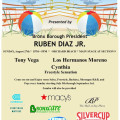The Vanishing Garifuna Songs
By José Francisco Ávila
Haga clic para leer en Español
Over the past weeks, I’ve engaged some of my friends in discussions about Garifuna Songs. My argument is that after analyzing Garifuna Music for the past 4 Years, I can’t help but notice that most releases are pure electronics and drumming. On the Urban Genre, they simply rap over beats downloaded from the Internet, therefore in both cases the music sounds monotonous! Downloaded beats represent a Copyright infringement risk! However, my biggest concern is the lack of creativity in songwriting. In both cases, singers think all they have to do is rhyme for the sake of rhyming, forgetting that a song must tell a story.
In my opinion, the problem lies in the lack of a Powerhouse songwriting and production team. These production teams are the main drivers that keep the superstar artists on top. Working in teams allows these writers to put out tons of high quality songs which consumers like. [1] A key member of the team is the Artists and Repertoire (A&R), which is the part of the business that deals directly with the artists signed to the label, and helps select the songs they record if they don’t write for themselves. It’s the very heart of the Music Industry. [2]
That is the foundation of the Garifuna Music Awards’ objective to promote professional excellence, a better understanding and greater appreciation for Garifuna Music; and to provide a public forum for songwriters, performers and musicians in order to recognize their artistic efforts.
A key element of the objective is the Song of the Year Category. Song of the Year is awarded for a single or individual track; the recipient of this award is the songwriter who actually wrote the lyrics and/or melodies to the song. Thus, “song” in this context means the song as composed, not the recording. Let’s review what some of songwriting experts have to say.
According to the UNESCO Candidature Form, “Garifuna Music essentially consists of various types of songs that are utilized for different purposes in the culture. The songs are poetry. They capture the history, the values, the aspirations, the concerns and the deepest feelings of a people who have been kept illiterate in their own language. The songs capture and express the totality of the Garifuna experience and in a sense serve as a literature that is waiting to be committed to writing and translated into other languages for our common benefit.” [3]
Legendary Songwriter Smoky Robinson “A song has to be like short book or short movie or short story, where everything ties in together, it has to have a beginning a middle and an ending that tie them together and even if you don’t end it you give people enough information so that their imaginations can end it for them” Berry Gordy’s advice to Smokey Robinson [4]
Miami-based producer Rudy Pérez, “I always, always, always try to get the song content that I’m involved with. A lot of people today, they write songs that begin with a loop. You go to a songwriting session, and they say, “Check this loop out.” I’m like, “Why don’t we go to the piano, find a melody, some chord changes?” ” And that’s the mentality of today’s youth. They don’t realize that once you run out of those loops you got to go back to the essence. Go to Stevie Wonder, Paul McCartney.
So I always like to make sure that the songs have some worthiness to be in a record. To me, if the song doesn’t do something for me in the first 30 seconds, it isn’t happening. Don’t wait for the chorus. Have a storyline that people understand in the street. And then again, you have to have some kind of surprise and some refreshing phrase here and there. And as long as people keep falling in love and falling out of love, I still have a job. Love songs will be around forever.” [5]
Songwriter & Artist Erika Ender cowriter of “Despacito” “Connecting with the idea of getting Luis Fonsi out of the comfort zone, but at the same time having a message that has poetry, that is classy. I have no taboos at all with [sexy lyrics], because we’re all here because our parents had sex. But I do believe that the way you explain things, the way you communicate, it makes the whole difference. And this is a song that is very sensual, but it’s very poetic at the same time. So it never crosses the line to be vulgar in any way.” [6]
So there you have it straight from the songwriting experts! Great Songwriting is the foundation of the Garifuna Music Awards’ objective to promote professional excellence, a better understanding and greater appreciation for Garifuna Music; and to provide a public forum for songwriters, performers and musicians in order to recognize their artistic efforts.
All Songs submitted for consideration will be analyzed on their individual musical attributes. These attributes cover every detail of melody, harmony, rhythm, form, instrumentation, and vocal performance, in addition to compliance with Intellectual Property requirements, to avoid Copyright infringement risk!
[1] Honeyman, ThomasHow One Generation Was Single-Handedly Able To Kill The Music Industry, Elite Daily, June 6 2014[2] Davis, Clive, The soundtrack of my life, February 19, 2013
[3] UNESCO Candidature, Standard Form Proclamation of Masterpieces of the Oral
and Intangible Heritage of Humanity
[4] The Sound of Young America: The History of Motown, The Obama White House Youtube Channel, February 24, 2011
[5] Q&A: Rudy Pérez, Billboard.com 4/26/2005
[6] Kawashima, Dale Hit Songwriter & Artist Erika Ender Tells How She Co-Wrote the #1 Worldwide Hit, “Despacito” by Luis Fonsi, Daddy Yankee & Justin Bieber, Songwriteruniverse Magazine, August 31, 2017

















Follow Us